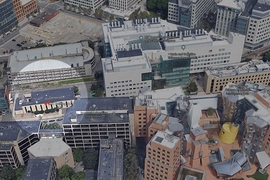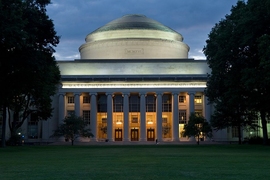The MIT Department of Earth, Atmospheric and Planetary Sciences (EAPS) has expanded its academic program to include a new doctoral field: computational Earth, atmospheric, and planetary sciences.
EAPS is now the latest department to participate in the Computational Science and Engineering (CSE) Program, which has been offering PhD degrees in computation since 2013. This move resonates with the Institute’s growing awareness of the advantages provided by education based in computation, as exemplified by the recent creation of the MIT Stephen A. Schwarzman College of Computing.
While enrolled in the CSE program, students are able to specialize at the doctoral level in a computation-related field of their choice through focused coursework and a doctoral thesis through a number of participating host departments, including Aeronautics and Astronautics, Chemical Engineering, Civil and Environmental Engineering, Mechanical Engineering, Mathematics, Nuclear Science and Engineering, and now EAPS.
EAPS-affiliated CSE graduate students will be able to analyze complex Earth and planetary systems, and mysteries of the natural world, leveraging cutting-edge computing and data science.
“Computation is playing an ever-growing role in addressing earth science questions, like those central to the study of climate and earthquakes,” says Raffaele Ferrari, the Cecil and Ida Green Professor of Oceanography and chair of the EAPS Program in Atmospheres, Oceans and Climate (PAOC), who helped to shepherd the creation of the new degree. “Adding the PhD track will ensure that the department remains an educational leader, fostering the next generation of earth researchers.”
The new computational Earth, atmospheric, and planetary sciences degree offers several advantages for the department and its graduate students: EAPS members are already performing state-of-the-art computational research, and Earth science disciplines are increasingly incorporating elements of artificial intelligence and machine learning. By integrating modern computational techniques and machine intelligence developed at MIT into the curriculum, the department will improve the visibility of this research, enhance its ability to attract and produce top talent in computational science, as well as remain at the forefront of geoscience study and education.
MIT has progressively invested in computation’s use around the Institute and in the classroom, with several initiatives and the formation of the MIT Schwarzman College of Computing. Sharing MIT’s vision, thesis activities of EAPS computational Earth, atmospheric, and planetary sciences candidates will emphasize the development of new computational methods and/or the innovative application of computational techniques to important problems in fields ranging from geophysics to climate science.
Finally, this interdisciplinary training will equip EAPS faculty and students to tackle next-level research questions in novel ways. Having received credit for their work, EAPS graduates of the program will come away with enhanced opportunities for when they take their next career step.
"This degree will offer graduate students the skills to tackle computationally demanding problems related to the Earth and planets," says Taylor Perron, EAPS associate professor of geology and associate department head, who helps to oversee the department’s educational program, "and the opportunity to interact with other computation and data specialists from across the Institute."










